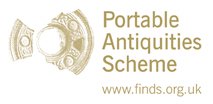Server check!
You are on the training database
About the Scheme
The Portable Antiquities Scheme (PAS) is managed by the British Museum and records archaeological finds discovered by the public.
It plays a critical role in advancing knowledge, telling stories of past communities and furthering public interest in the past. It's a partnership project, managed by the British Museum (in England) and Amgueddfa Cymru - National Museum Wales.
The PAS works with at least 119 national and local partners, and delivers through its network of 40 locally based Finds Liaison Officers, the PAS Central Unit (based at the British Museum), National Finds Advisers, interns and volunteers.
To date, over 1.5 million items have been recorded, from prehistoric-worked flint to post-medieval dress accessories.
All have been found by everyday people by chance, most through metal detecting.
All the finds recorded by the Scheme are made publicly available on its online database and are helping to transform our understanding of Britain's past.
The British Museum manages the Portable Antiquities Scheme (PAS) and oversees the administration of the Treasure Act 1996 (both in England). We also host the secretariat for Treasure cases in England, Wales and Northern Ireland.
Our vision and aims
The PAS seeks to transform knowledge and understanding of the archaeology and history of England and Wales through the recording of archaeological finds discovered by the public.
In order to do this the PAS:
- promotes the reporting and preservation by record of portable antiquities for the benefit and wellbeing of present and future generations;
- encourages best practice by finders/landowners and archaeologists/museums in the discovery, recording and conservation of finds made by the public;
- in partnership with museums and others, raises awareness of the importance of recording archaeological finds in their context and facilitates research in them;
- creates partnerships between finders and museums/archaeologists to increase participation in archaeology, thereby advancing our understanding of the past;
- supports the Treasure Act 1996 and increases opportunities for museums to acquire archaeological finds for public benefit.
History of the PAS
The Portable Antiquities Scheme (PAS) was founded in response to the growth of metal detecting, the lack of provision to record these finds, and in the context of the reform of Treasure legislation.
In 1997, the Treasure Act 1996, came into force and with it new protection for archaeological finds.
Although archaeologists welcomed the reform of the law, they expressed concern that many significant items were not covered by the Act, especially those that were not precious metal.
As a result pilot 'schemes' for the voluntary recording of archaeological finds was set up in six areas. A further five post and an Outreach Officer were established in 1999.
Funding
Thanks to support from The National Lottery Heritage Fund the PAS was expanded to the whole of England and Wales in 2003, and thereafter (from 2006) funded by the DCMS.
In 2007 the management of the PAS transferred to the British Museum, and is now funded through its grant-in-aid with local partner contributions.
Its network includes 40 locally based Finds Liaison Officers whose role it is to liaise with the public and record their discoveries on the PAS database.


